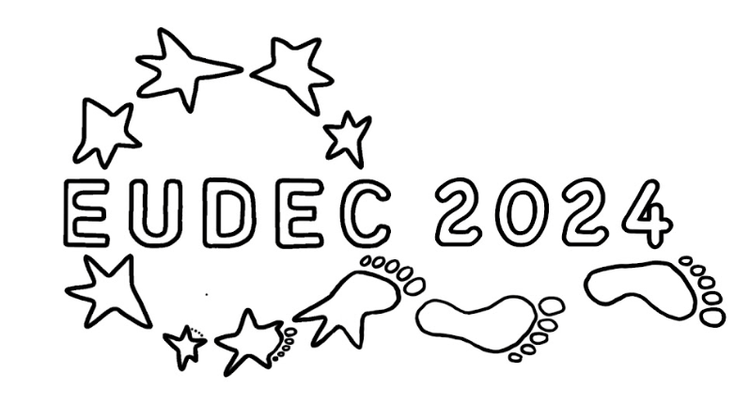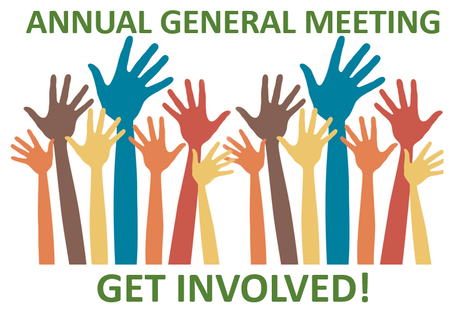The Annual General Meeting is the circle with the highest authority in EUDEC. Aside from being the place to change the Guidance Document, it is also a opportunity for the members to supervise the work that the council has done throughout the year. Elections will also take place…
For any question or comment, please join at any moment the “Agora” room (Zoom Id: 320 304 8388, Pass: EJL06).
Friday 18 Dec.
15:00 – 17:00 UTC
(16:00 – 18:00 CET : Paris, Berlin…) (17:00 – 19:00 EET : Athens, Bucarest…) (…)
“Agora” room (Zoom Id: 320 304 8388, Pass: EJL06)
Informal moment between members (all members are welcome!)
17:00 – 20:00 UTC
(18:00 – 21:00 CET : Paris, Berlin…) (19:00 – 22:00 EET : Athens, Bucarest…) (…)
“Online AGM” room (Zoom Id: 845 8648 4314, Pass: check invitation email or ask in the “Agora” room)
“Agora” room stays open (Zoom Id: 320 304 8388, Pass: EJL06)
Online AGM – Reports (45 minutes)
- 1. OC Report
- 2. Council Report
- 3. Community Report
- 4. Financial Report
- 5. Auditors’ Report
- 6. Budget 2021 presentation
- 7. Report: Summerhill Festival of Childhood
Online AGM – Elections (45 minutes)
- 10. Election of two new people in “Council” (Katrin and Magi resigned)
- 11. Election of the two “Auditors” (because their election was 2 years ago): they monitor, audit and report on EUDEC bookkeeping
- 12. Election of two members of “Oversight Committee” (because their election was 2 years ago): they arbitrates disputes and addresses members’ complaints
Online AGM – Presentation of Saturdays workshops (20 minutes)
Online AGM – Proposals (part 1) (30 minutes) (most proposals will be processed on Saturday afternoon, see below)
Saturday 19 Dec.
“Agora” room stays open the whole day (Zoom Id: 320 304 8388, Pass: EJL06)
9:00 – 10:30 UTC
(10:00 – 11:30 CET : Paris, Berlin…) (11:00 – 12:30 EET : Athens, Bucarest…) (…)
Workshop 30. “Making AGM more accessible” (workshops and online-streaming) (Organizer: Masha and council)
“Workshop” room I (Zoom Id: 860 3336 8018, Pass: check invitation email or ask in the “Agora” room)
Workshop 32. “Developing a theory of Democratic Schools” (Organizer: Henning) (see details at the bottom of this page)
“Workshop” room II (Zoom Id: 857 419 3441, Pass: check invitation email or ask in the “Agora” room)
10:30 – 12:00 UTC
(11:30 – 13:00 CET : Paris, Berlin…) (12:30 – 14:00 EET : Athens, Bucarest…) (…)
Workshop 33. “Democratic Education with UNESCO” (Organizer: Maro) (see details at the bottom of this page)
“Workshop” room I (Zoom Id: 860 3336 8018, Pass: check invitation email or ask in the “Agora” room)
Workshop 31. “Structure of EUDEC” (Organizer: Guilain) (see details at the bottom of this page)
“Workshop” room II (Zoom Id: 857 419 3441, Pass: check invitation email or ask in the “Agora” room)
14:00 – 17:00 UTC
(15:00 – 18:00 CET : Paris, Berlin…) (16:00 – 19:00 EET : Athens, Bucarest…)
“Online AGM” room (Zoom Id: 827 1136 4475, Pass: check invitation email or ask in the “Agora” room)
Online AGM – Workshops reports (20 minutes)
Online AGM – Proposals (2 hours)
- 6. Budget 2021 discussion and approuval
- 20. (proposed by Council) EUDEC 2022 venue: Proposal Bulgaria
- 21. (proposed by Council) Proposal on changing voting process: “In AGM, if a member makes a proposal that is longer than 5 lines, amendments related to this proposal are not voted, but the member decides if s/he accepts the amendments or not. (S/he can ask the AGM participants to give their opinion rapidly, with an invitation to raise their hand if they find that the amendment is a good idea…) ”
- 22. (proposed by Lena) Include an ‘equal representation clause’ to the conference agreement. ‘Conference organisers pledge to make their panels as diverse as possible (race, colour, ethnicity, gender, age, ability, nationality, sexual orientation), at the very least, 50% should be female, with an active effort to include speakers of colour).
- 23. (proposed by Lena) Council starts work to provide a list of potential speakers on the eudec website according to the equal representation clause.
- 24. (proposed by Lena) The equal representation clause is added to the GD as a general requirement for events which use the EUDEC ‘brand’ identity and logo. (change to GD will require a 2/3 majority).
- 25. (proposed by Henning) Change the wording of the introductory page of the EUDEC Diploma back to the first version (as stated at the bottom of this page).
Online AGM – Feedback and closing of AGM (20 minutes)
Annexes
Details of Proposal 25. :
Preface
Through this diploma our school, the [___-School] will present Peter Muster’s developments, strengths, qualities, academic skills and other acquired competencies which he has had the opportunity to develop.
Democratic Schools
[___-School] is part of an international network of democratic schools that work according to the following principle:
We believe that, in any educational setting, young people have the right
• to decide individually how, when, what, where and with whom they learn
• to have an equal share in the decision-making as to how their organizations – in particular their schools – are run, and which rules and sanctions, if any, are necessary.
(Resolution of the International Democratic Education Conference, Berlin 2005)
More information about this type of school can be found, for example, on the website of the European Democratic Education Community (EUDEC – www.eudec.org), as well as on the [___-School] website.
Key Competencies
Experience has shown that people acquire the following key competencies through their life and learning at a democratic school:
The special organization of the learning process results in:
- personal responsibility
- independence
- conscious choice of interests
- emotional intelligence
- self-awareness
The high level of participation in the organization of everyday school life results in:
- ability to work in a team
- flexibility
- openness for the opinions of others
- ability to deal with criticism
- negotiation and conflict resolution skills
- sense of responsibility for others
[German translation is also provided]
Details of Workshop 31. “Structure of EUDEC”
The structure of EUDEC could be improved so that more members want to be active in EUDEC.
For the moment, it is frustrating for everyone (for both members outside of the Council and members in the Council):
- Members outside of the Council can only take part of decisions during the AGM (a few hours per year!), they have less power, they always have to ask permission and wait for an answer, they are never sure that their voice will be heard and that the Council is competent enough to make the good decisions…
- Members in the Council have a lot of pressure, they are blamed when there are some problems, they have to deal with every details of every parts of the association, and it’s difficult to adapt the amount of their EUDEC work to their live conditions (they are elected for 2-years, live conditions could change in this period, and it’s not easy to be replaced)…
I would like to make a “EUDEC structure changes” proposal in AGM 2021 (in Summerhill). Last proposal of this kind was promising (AGM 2019 in Kiev), but we didn’t provide a new Guidance Document version that would include the changes. Also, for such big changes, amendements system has to be simpler (we only have a few hours!) (see proposal 21. that will be voted in this AGM 2020). As a result, it couldn’t be adopted. This time, we will have more chance!
Basically (but it’s to be discussed), I would suggest 2 major changes:
Council members would have the same decision-power than other members, and would have only 2 specific responsabilities (they can take more if they want, of course):
- knowing everything that is happening in a specific “circle” of the association (for example a “circle” called “Membership management and relations with chapters”).
- taking part in regular “coordination meetings” where every active members would be invited to talk about the problems s·he sees in EUDEC and about the work that has been done
The decisions that are not strategic would be taken in the Basecamp team of the concerned “circle” with a asynchronous process. Every members can join any “circle” (= join the Basecamp team) and then have a voice. If one member thinks the decision should be made on AGM, it’s postponed to AGM (eventualy, depending on how many decision should be made on AGM, we could organise online AGM during the year). Here is a list of what the 7 “circles” could be:
- Finance
- Membership management and relations with chapters
- Organisation and animation of EUDEC meetings (conference, congress, coordination events…)
- Internal communication tools (Basecamp, internal newsletter…)
- External communication tools (website, external newsletter, social medias…)
- Lobbying and relations with other structures
- Students involvment and participation
I’m impatient to discuss with you about all this in the workshop 🙂
Guilain
Details of Workshop 32. “Developing a theory of Democratic Schools”
Why do traditional schools persist against all odds? One reason is: they are deeply rooted in the way we think. They are backed up by implicit assumptions and by explicit theory.
One weakness of the democratic schools movement is that it has not yet developed a theory of its own. That could be one reason why the democratic schools at the universities have so far hardly been noticed and play almost no role in teacher training.
The need for a theory of democratic schools arises from the experience that there are different understandings of what is meant by a democratic school. These different views can be in contradiction to one another without either of them being “wrong”. A theory is required to describe these differences and understand the underlying concepts. Let’s start to develop one (… or two)!
Details of Worshop 33. “Futures of education”
UNESCO’s Futures of Education initiative is an ambitious attempt to rethink education and help shape the future. The initiative is catalyzing a global debate on how education, learning and knowledge need to be re-imagined in a world of increasing complexity, uncertainty, and precarity. As part of this initiative, UNESCO has appointed a high-level International Commission of thought leaders with diverse expertise and perspectives from the worlds of politics, academia, the arts, science and business. The International Commission will prepare a report, to be released in November 2021, that will provide an agenda for action and discussion by policymakers and practitioners.
UNESCO invites organizations and networks to mobilize their stakeholders and partners to conduct focus group consultation sessions on the futures of education. The insights gained through focus group discussions will be synthesized for UNESCO’s International Commission on the Futures of Education and will help to shape the global debate.
We think it is important that EUDEC participates in the dialogue and has a say to a potential educational reformation. Our report will be included in the project’s final report which forms the sustainability goals all countries have to achieve.
The workshop will last one and a half hour and the questions we have to answer are about the defaults we find in the current conventional education system, the good practices we would like to include in the future and how would we imagine schools (education in general) so that it builts knoledge as a global common good for the year 2050 and beyond.
The participants will be acknowledged with their name and job title (if they choose to) in the report that will be submitted by 31-12-2020 when the project ends.


